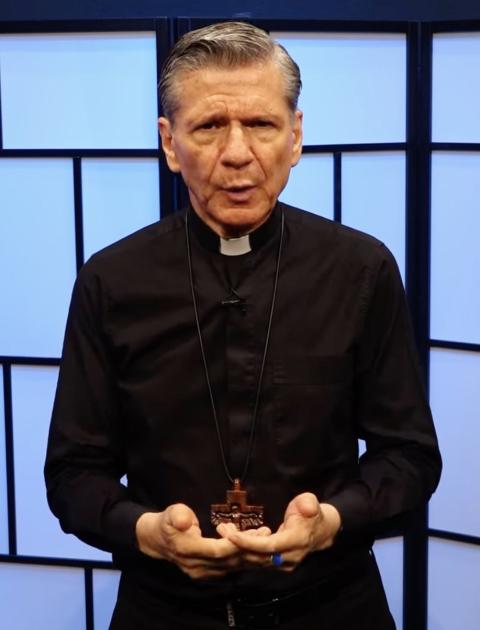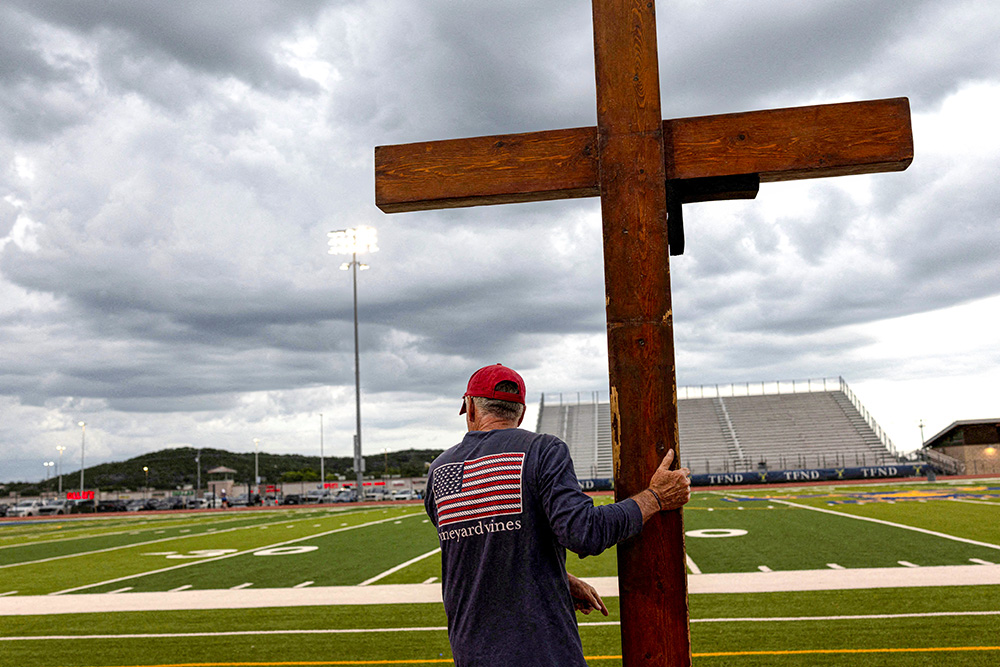
A man holds a cross during a prayer service for flood victims in Kerrville, Texas, July 9, 2025. (OSV News/Reuters/Umit Bektas)
On Sunday, July 6, two days after the floodwaters tore through Kerr County, Texas — while families were still searching for missing loved ones and the region's grief had barely begun to take shape — Archbishop Gustavo García-Siller of San Antonio stood before a shaken congregation in Kerrville's Notre Dame Catholic Church and installed their new pastor.
"Are you sure that you want the installation? We can move it," the archbishop had asked the newly assigned priest, Fr. Scott Janysek, just days before.
Janysek's response was simple. "I consulted with my people and my council, and that will be fine. But please, do it very low-key," he said.
And so just after the deadliest flooding in the region's recent history, the San Antonio Archdiocese quietly gave this grieving community a shepherd.
"It came as a powerful sign," García-Siller said, "of how God cares for his people ... because God, in time of crisis — not only for the Catholics in that community, in Notre Dame Parish, but in the city and the region — God was providing with a pastor, and God was providing for lay leaders, committing themselves in very dark times to be for the people."
It wasn't just a liturgical formality. That Sunday's Mass, with its baptisms and bare solemnity, became a defiant declaration of faith amid loss. Some in the pews had lost family members. Others still didn't know if their relatives were alive.
"There were people there that lost families," García-Siller said, "people who didn't know what happened with relatives, friends, neighbors. It's just to see God's presence. We don't put that together. God does."
Two days earlier, García-Siller had rushed to the heart of the flooded region, arriving in Kerr County under steady rain and heading straight to Notre Dame Parish closest to the disaster zone. The mood was grim and still.
"The environment was ... quiet," he said slowly, choosing each word. "You were able to sense the heaviness of the moment." He had entered the reunification center where survivors and family members waited, not for news, but for answers. Most hadn't yet heard if their loved ones had survived.
"There were people scared, an environment of uncertainty and already pain," he said. "But a pain that was not that concrete, because they really didn't know if their beloved ones were alive or not."
García-Siller described a cross-section of humanity: elderly grandparents waiting for word about grandchildren, seasonal workers missing friends and coworkers, neighbors helping young families whose parents were still unaccounted for.
Advertisement
"One of them told me: 'Archbishop, I just want to be out of the way. I don't want to be an obstacle here.' Everyone tried to cooperate for this process to continue."
When officials began to share the names of survivors and victims, García-Siller saw something that struck him deeply.
"When they heard the name of the beloved one," he said, "they were not expressive, like, 'Wow, joy!' No, they were very modest. When they were encountering the beloved one is when they expressed themselves, not verbally. They were caressing one another, kissing each other, embracing one another."
Less than a week after the flash flooding swept through Central Texas, more than 120 people are confirmed dead and at least 160 remain missing, with Kerr County alone reporting 96 fatalities, including 36 children. As rescue crews continue searching through debris and flood zones, officials warn that hopes of finding survivors are fading.
Texas Gov. Greg Abbott vowed that the search will not stop "until every missing person is accounted for."
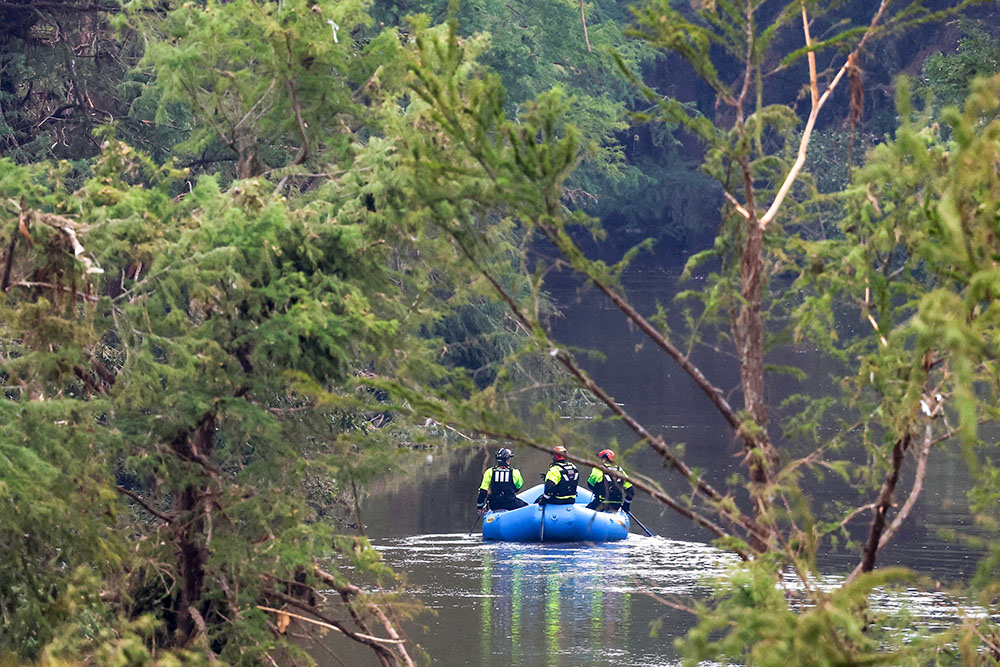
Rescuers paddle an inflatable boat as they search along a waterway in the aftermath of deadly flooding in Kerrville, Texas, July 6, 2025. (OSV News/Reuters/Marco Bello)
Meanwhile, forecasters warn that more rain could hit the already devastated Hill Country of Central and South Texas. The disaster has also extended beyond state lines, with at least three flood-related deaths reported in Ruidoso, New Mexico, a community that is still recovering from last year's wildfires.
Beyond the confirmed casualties — vacationing families and local residents — García-Siller pointed to another layer of the disaster that is less visible and more difficult to quantify. "There were people that were going just for the Fourth of July," he said. "People who live in very modest little structures, and they work for those camps in cleaning, in cooking, people who helped the vacationers."
Many remain unaccounted for. Some may have been undocumented workers; others had no nearby family to report them missing, he said. "For the most part, we don't know much about them, and there are many reasons for it," García-Siller said. "It's delicate."
He added that all victims, identified or not, must remain in public concern. "No one should be out of our prayers," he said. "And if we serve people with material goods, it's to everyone and for everyone."
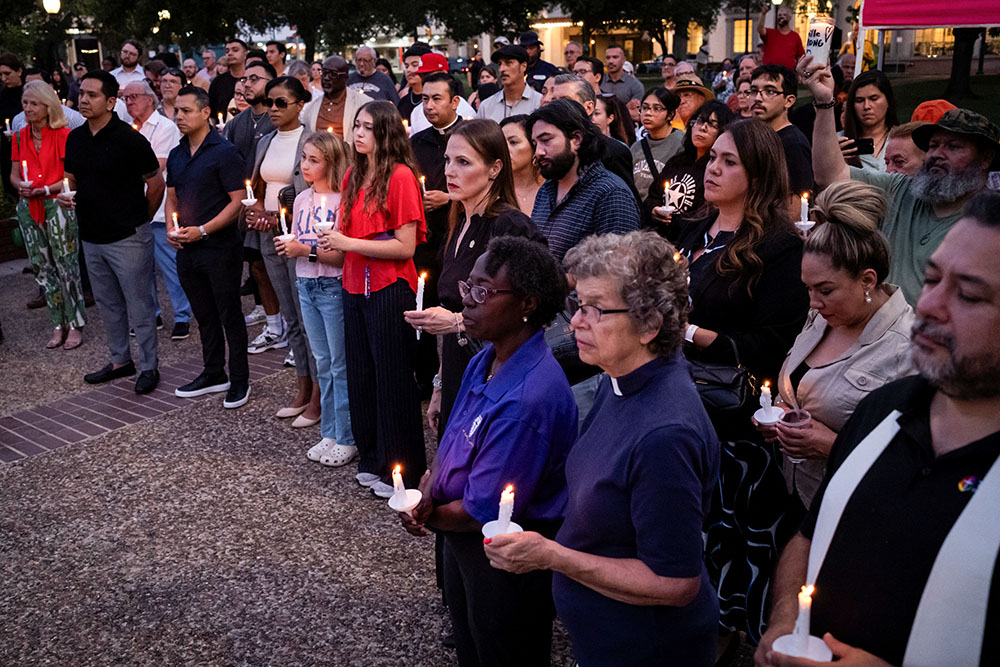
People take part in a vigil in memory of Texas flooding victims at Travis Park in San Antonio July 7, 2025. (OSV News/Reuters/Marco Bello)
Two of the youngest victims of the Guadalupe River flooding have been identified as Blair and Brooke Harber, sisters from the St. Rita Catholic Community in Dallas. The girls, rising sixth and eighth graders, were staying with their grandparents at a cabin in Kerr County when the floodwaters surged through. Their grandparents remain missing. The girls' parents, RJ and Annie Harber — a longtime faculty member at St. Rita — were in a nearby cabin and survived.
The St. Rita community remembered Blair and Brooke as bright, faith-filled students who were involved in school life, from sports and drama to student leadership. On the night of the flood, they had gone to the loft of their cabin to pray the rosary. When their bodies were recovered the next day, 15 miles downriver, they were found together.
"This tragedy has touched every corner of our hearts," the parish said in a statement, adding that it would continue to support the Harber family "with our prayers, compassion, and unwavering support."
Among the youngest dead are also young girls who were attending summer session at Camp Mystic, a private Christian camp in Kerr County that was directly in the path of the rising Guadalupe River. At least 27 campers and counselors died.
For many camp leaders, the loss of young lives struck close to home. "This has been a very sobering and sad week," said Gregg Hunter, president and CEO of the Christian Camp and Conference Association, which serves nearly 850 faith-based camps and retreat centers nationwide, including The Pines Catholic Camp in Texas. "Our members are so aware of and sensitive and grieving, along with those who have lost children. It's not a far leap for them to imagine themselves in the same position."
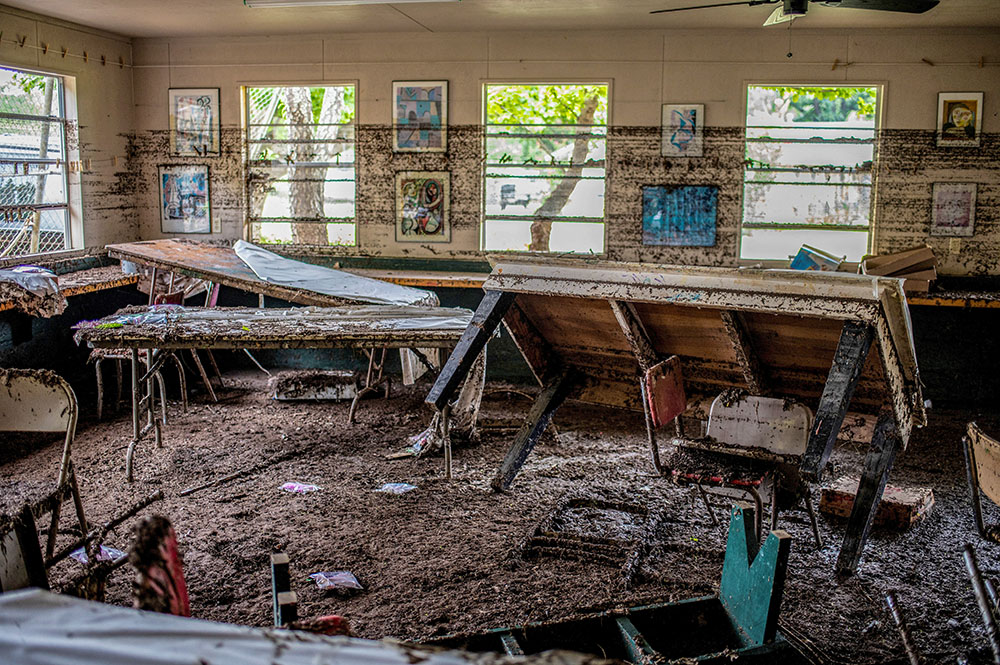
Damaged items lie inside of a cabin at Camp Mystic in Kerr County, Texas, July 7, 2025, in the aftermath of deadly flooding. (OSV News/Reuters/Sergio Flores)
Though Camp Mystic is not part of Hunter's network, he said the event has prompted camps nationwide to revisit their own emergency procedures.
"What I know beyond a doubt is that this type of event causes leaders to take one more look at what they have in place," he said. "They're asking their teams, 'Do we have everything in place that we need to? What if that happened to us?' "
Hunter said many Texas camps were caught off guard by the severity of the flooding. "There were some indications that storms were coming," he said, "but it turned out to be a perfect storm that brought the levels of rainfall that are unprecedented to them."
Despite the heartbreak, while reassuring of the safety of emergency protocols of American camps, Hunter emphasized the continued importance of faith-based camping. "Kids need a camping experience these days," he said. "To unplug from devices, to be in nature and close to God, where they can be inspired and hear from him what the picture of the rest of their life looks like."
"I'm grateful for the Catholic camp leaders who are serving kids this week, who are grieving themselves about the loss at Camp Mystic. And, I am thankful for Catholic Charities and their long-standing commitment to meet community needs. I'm sure the communities in Kerr County will be relying on their resources for recovery efforts," Hunter said.
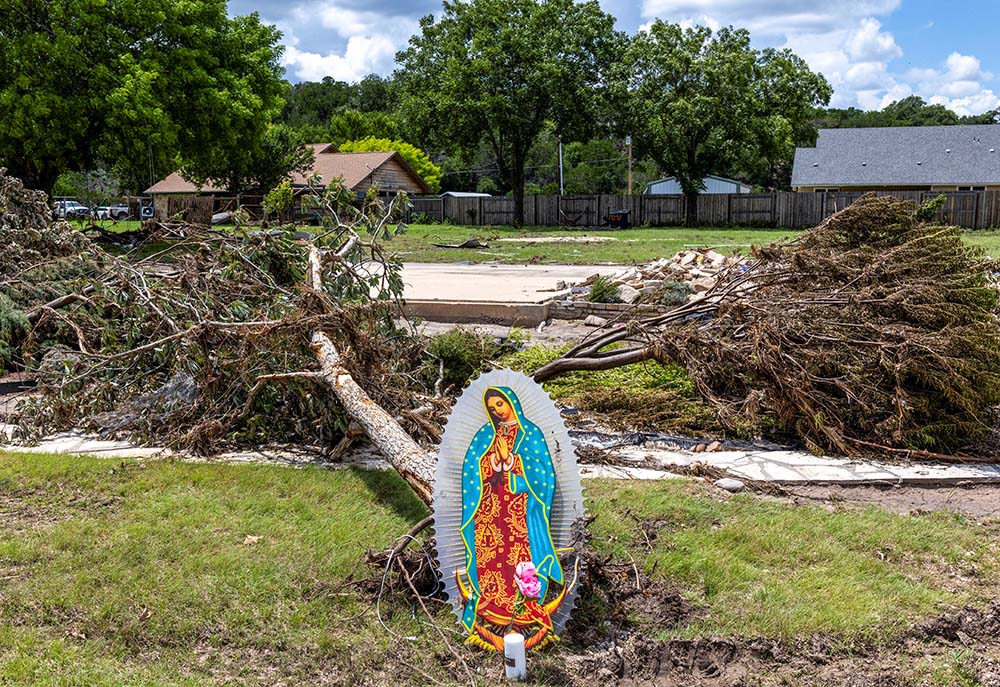
An image of Our Lady of Guadalupe sits next to fallen trees near the Guadalupe River in Hunt, Texas, July 9, 2025, in the aftermath of catastrophic flooding. (OSV News/Reuters/Umit Bektas)
At the July 6 Mass at Notre Dame Church, where many in the congregation were still awaiting news about missing loved ones, the archbishop described the contrast of a baptismal ritual centered on water taking place just miles from where floodwaters had caused extensive destruction and death. "The baptism is about the water and the Spirit," he said. "And it is about life and death."
When the congregation responded to the Psalm — "Praise God with joy" — he noted the weight of the moment. "They were praising. In the midst of pain, death, sorrow."
When asked about reports of a delayed flood alert — a window of several hours when no emergency warning was issued, according to a Texas Tribune investigation — García-Siller said he could not speak to the specifics.
"I'm not the expert in those matters," he said. "But I, personally, as a pastor, accompany people. That's what God is asking me to do, to accompany and to be with them."
He suggested such discussions could be addressed at a later time, cautioning against politicizing the tragedy during the early stages of recovery. "It's a distraction and will just cause feelings that they don't need to add to their horrible picture."

